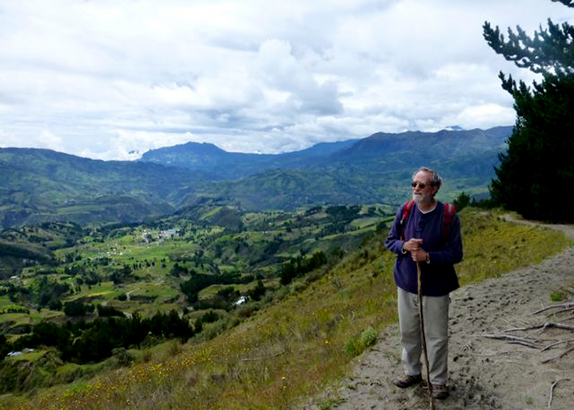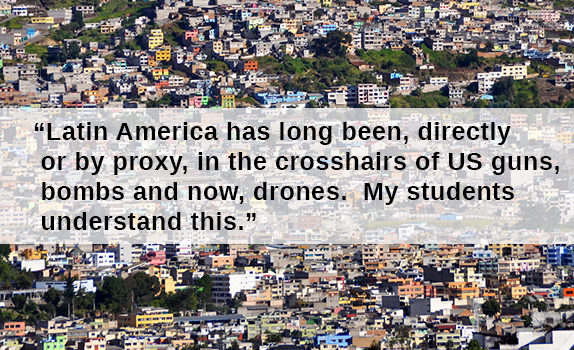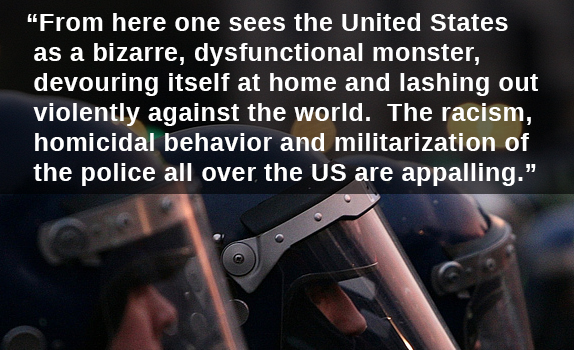
Lately warplanes have been flying training missions over my apartment here in el Centro Histórico, Quito’s old city, an unusual occurrence, dredging up particular unpleasant associations with my home in Albuquerque, near Kirtland Air Force Base. I often tell people it is a relief to be staying in a country that is not bombing the hell out of the rest of the world, not that I kid myself this is due to some unique, pacific aspect of Ecuadorian character that does not exist in other humans. Empires and their rabid attack dogs bomb; small countries, such as Ecuador, get along. But there is a quality here that is different, at least as far as ordinary people are concerned. The ruling class is another story, as it is everywhere. And of course there is a ruling class in Ecuador.
Ecuadorians will tell you how much things have changed, and this is true. Nevertheless, there remains a humility and warmth to this culture that does not exist in the US. It is a terrible burden to be the world’s “exceptional nation,” a thing from which Ecuadorians are happily relieved and self-deprecatingly recognize as beyond their grasp. People here understand that their material status and national power will never be that great and therefore accept necessary limitations, which breeds a certain humility. This is a profound cultural difference. In the US we are conditioned to accept no limits. The poor in the US, as Steinbeck half-facetiously remarked, view themselves as temporarily embarrassed millionaires, common sense and more egalitarian ideals overwhelmed by illusions of Gatesian riches. The dominant mood now though is one of despair rather than temporary embarrassment, alleviated momentarily if the cherished team wins on Sunday, in past times an anodyne function fulfilled by the church.

I teach English at a university here. My students are polite but they are well aware of the history of US depredations in Latin America. I make it a point to tell them that while there are many things about my native country that I love, the art, music and literature, my home state of New Mexico, the many good people, there is much that I do not love. One of the things that I do not love about the US, I tell them, is its incessant, pathological violence, internally, and towards the rest of the world. They understand this all too well. But there is a difference between my perception of this violence and theirs. As a US citizen not yet deemed a terrorist by my own government (though my local police department may be gunning for me when I return; since 2010 The Albuquerque Police Department has killed 24 people), I still remain on the safe side of the Predator drones and Hellfire missiles, in the control rooms, as it were. The rest of humanity, especially in the poorer, darker-complexioned regions of the world, feels no such assurances. Latin America has long been, directly or by proxy, in the crosshairs of US guns, bombs and now, drones. My students understand this. People here are afraid of the United States.
I am ashamed that people are afraid of my native land. This likely puts me in the minority in the US, where many, if not most, would rather be feared than respected. It certainly puts me at odds with the country’s rulers. Sometimes, walking in the streets, you see this fear. I live in a neighborhood where there are few gringos. Normally, the reactions I get from people in my neighborhood range from apparent indifference to curiosity to friendliness, with real warmth from those I have come to know. But there are times when there is no mistaking the fear. A person walking towards you reacts with a visible tightening, invariably followed by an expression of defiance. It is clear that I represent something threatening, which always makes me feel bad.
As a child of empire one does what one can to break the barriers of fear and mistrust, constantly striving to connect on a basic human level. Most foreigners who live here do so in enclaves, insulating themselves from the culture. The rich, mostly from Europe and the United States, are moving in, buying up land, recapitulating a classic pattern. The poor, the traditional cultures, are increasingly marginalized. I recognize that I am but a small piece of a historical phenomenon, something like a drifting metastatic cell. I tell myself that I mean well, but in the end, as much as I try to adapt, I contribute to the subversion of the culture. Ultimately, one belongs nowhere, caught between worlds.

From here one sees the United States as a bizarre, dysfunctional monster, devouring itself at home and lashing out violently against the world. The racism, homicidal behavior and militarization of the police all over the US are appalling. It is supremely depressing to witness the renewed military action in Iraq, even more so when one considers that the US bears primary responsibility for creating this absurd and gruesome situation in the first place. There may be a method to the madness of US foreign policy, but it is a method drenched in blood. The United States has become the world’s arsonist, setting fires and then purporting to quell them by igniting more fires. At the same time it supplies the rest of its deranged family members, its “allies,” with fresh boxes of matches. The elementarily predictable outcome is that it only makes things worse, killing innocents, sowing more hatred, steeling the resolve to oppose the violence and bullying. The stupidity, waste and sheer danger of this is staggering, for the world and for the majority of the United States’ own citizens. Only the military/industrial complex profits. The United States, I tell people here, is a country cast loose from its moorings, and all the more dangerous because of it. But this is something most already know.
In general, the stance towards the monster to the north is one of wariness, and sometimes hostility, but not without a touch of admiration as well. The US, along with its violence and bullying, is also seen as a paragon of technology. Ecuador is committed to modernization and has placed its foot firmly on this path. Most people here agree with this course and are strong supporters of president Rafael Correa’s developmental agenda, despite the environmental destruction and decimation of traditional cultures from the oil and mineral extraction that finances these ventures. The Correa government is full-speed-ahead with oil drilling in Yasuní-ITT (Ishpingo-Tambococha-Tiputini), one of the most biologically diverse regions in the world. An even larger block, the Pungarayacu heavy oil field, located in an equally rich area, the Misahuallí River watershed, a “Valle Sagrado” (sacred valley), is to be exploited by the government in partnership with Ivanhoe Energy of Canada, together with a third partner that will contribute the bulk of the financing, likely China. All over the country the beavers are working away, sucking oil out of the ground, adding more carbon dioxide to the atmosphere, felling trees, building roads and bridges, damming rivers, digging mines, poisoning watersheds, irrevocably altering the natural world and the lives of the indigenous population. As a result of this environmental and cultural trade-off, at least for now, living standards are better for the middle class, the poor get a few extra crumbs and the rich become richer.
My vantage point from el Centro Histórico offers a view of Ecuadorian society and perhaps a more objective perspective on my own, but what conclusions I am able to draw always come back to the same thing. Interconnected, environmental and human systems are collapsing under the burden of human population growth and a rapacious, consumptive paradigm. For the United States and “Western Civilization,” it has been a long time coming. For Latin America, despite some commendable socialist impulses and Bolivarian moves towards independence from the US and Western institutions, the International Monetary Fund, for example, essentially the same intensive resource-extractive, competitive model is employed. We’ll do the same thing, they seem to be saying, but we’ll do it our way. The jets flying above my apartment underscore the proposition.
(Photos: Quito houses by Rinaldo Wurglitsch, militarized police by Bob Bob.)




Responses to “The View from the Old City”